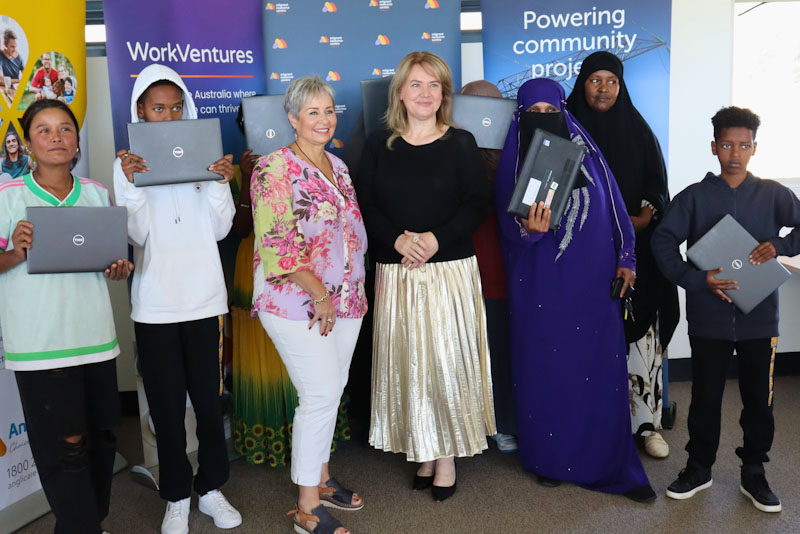WorkVentures breaks down digital barriers

WorkVentures Tech4Kids TAS – No Child Left Behind program started distributing free laptops in March.
The initiative, made possible with funding from the TCF and TasNetworks, is designed to bridge the digital divide and ensure students across the state have access to the technology and skills they need to succeed.
For single mother Phul Maya Tamang, receiving a free laptop will make a world of difference to her son’s education.
Ms Tamang’s son is one of 1,000 students throughout Tasmania who will benefit from the program, which provides free laptops thanks to a partnership between WorkVentures, TasCOSS and Anglicare.
At the official launch event this month, Ms Tamang said “Working with a small budget, it has always been hard to afford things like this, but I’m so excited to show my son what I have received (today) and see the impact it has on his learning,”
“I honestly believe this laptop will greatly improve his education and help him build a brighter future.
“Early on, he wanted to be a doctor, but now that he has entered high school, he is very keen on starting his own business and this laptop will be of great assistance in realising his dream.
“I would like to thank everyone involved in this amazing cause, your support is truly appreciated and will benefit many young people across Tasmania.”
WorkVentures Chief Executive Officer Caroline McDaid said young Tasmanians faced higher levels of digital exclusion than anywhere else in Australia and the Tech4Kids TAS – No child left behind was aimed at changing that.
“We believe every Tasmanian child has the right to a quality, holistic education and the opportunities afforded through connection to the digital world but unfortunately, right now, this is not the case,” she said.
At the launch of event, TCF Board Member Michelle Swallow talked to attendees about how the program provides practical and personal support on the laptops, but also educational support.
“Part of this program is really about providing both the resources and the education, support and training that will increase people's ability to participate in their learning and be ready for future careers.”
TCF Chairperson Kym Goodes said the three main barriers to digital inclusion in education were access, affordability and digital ability.
“The funds provided by the TCF and partner organisations will help directly tackle these barriers by allowing more children to have access to affordable technology” she said.
“Removing barriers to education, such as digital barriers, are critical to ensuring more children are able to engage with learning and achieve better educational outcomes.”
TasNetworks Executive Digital, Strategy and Customer Andrew Davis said the program was all about taking action to address the digital divide in Tasmania by providing laptops, internet plans, coaching and tech support to students in need.
“The fact that this program only started a few months ago and has already received more than 700 applications demonstrates that there is a definite demand in the community,” he said.
“There’s no doubt about the difference access to technology can make and I’m sure the students will take full advantage of having laptops to help aid their study.”
Jodie Stokes, General Manager Community Services, Anglicare Tasmania agreed and said the program was already receiving positive feedback from students.
“Tech4Kids project is important to Anglicare because it enables children to do their homework and keep connected with school,” she said.
This project is a holistic two-year digital uplift program supporting up to 1,000 Tasmanian primary and high school children with essentials for continued engagement in digital learning.
“A recent Telstra Foundation report estimated that 30% of students don’t have access to a laptop at home, which is the joint highest in Australia with Queensland, and 4% higher than national average,” Ms McDaid said.
“This highlights the need for laptops for learning as students return to school, particularly as when students don’t have adequate access to a computer, 84% of them have trouble keeping up with schoolwork.”
The Tech4Kids TAS – No child left behind program is thanks to the support of the TCF and was seen as a key opportunity to highlight the need for more organisations and government bodies to support the device gap for students through either funding or device donations.
“Thanks to our partnership with WorkVentures, TasCOSS and Anglicare we are going to make change and help address this real issue,” Mr Davis said.
“We’d encourage more businesses and government bodies to support the initiative as it will help to transform young people’s lives.”